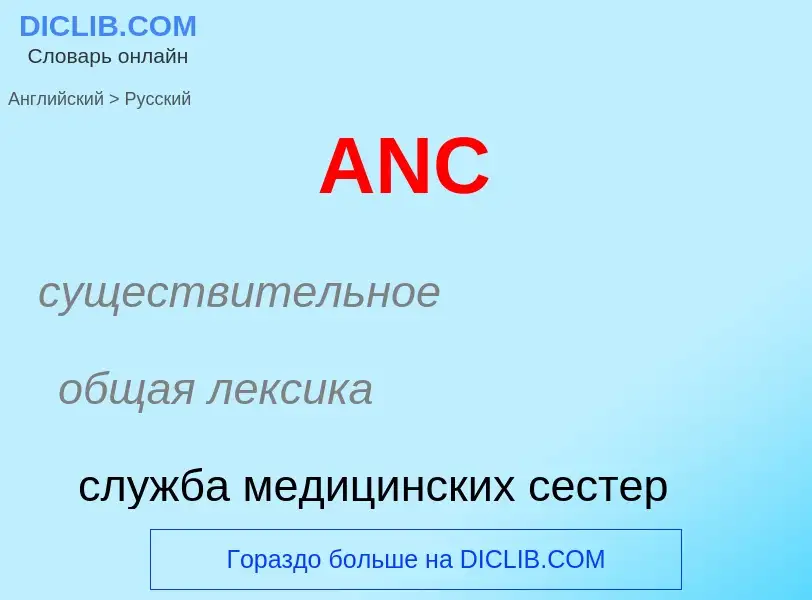Übersetzung und Analyse von Wörtern durch künstliche Intelligenz ChatGPT
Auf dieser Seite erhalten Sie eine detaillierte Analyse eines Wortes oder einer Phrase mithilfe der besten heute verfügbaren Technologie der künstlichen Intelligenz:
- wie das Wort verwendet wird
- Häufigkeit der Nutzung
- es wird häufiger in mündlicher oder schriftlicher Rede verwendet
- Wortübersetzungsoptionen
- Anwendungsbeispiele (mehrere Phrasen mit Übersetzung)
- Etymologie
ANC - Übersetzung nach russisch
существительное
общая лексика
служба медицинских сестер
синоним
[ænti'nɔiz]
общая лексика
антишумовой
строительное дело
шумозащитный, шумоизолирующий, противошумный
прилагательное
техника
противошумовой
противопомеховый
общая лексика
подавление шумов
нефтегазовая промышленность
подавление помех
Wikipedia
The African National Congress (ANC) is a social-democratic political party in South Africa. A liberation movement known for its opposition to apartheid, it has governed the country since 1994, when the first post-apartheid election installed Nelson Mandela as President of South Africa. Cyril Ramaphosa, the incumbent national President, has served as President of the ANC since 18 December 2017.
Founded on 8 January 1912 in Bloemfontein as the South African Native National Congress, the organisation was formed to agitate, by moderate methods, for the rights of black South Africans. When the National Party government came to power in 1948, the ANC's central purpose became to oppose the new government's policy of institutionalised apartheid. To this end, its methods and means of organisation shifted; its adoption of the techniques of mass politics, and the swelling of its membership, culminated in the Defiance Campaign of civil disobedience in 1952–53. The ANC was banned by the South African government between April 1960 – shortly after the Sharpeville massacre – and February 1990. During this period, despite periodic attempts to revive its domestic political underground, the ANC was forced into exile by increasing state repression, which saw many of its leaders imprisoned on Robben Island. Headquartered in Lusaka, Zambia, the exiled ANC dedicated much of its attention to a campaign of sabotage and guerrilla warfare against the apartheid state, carried out under its military wing, uMkhonto we Sizwe, which was founded in 1961 in partnership with the South African Communist Party (SACP). The ANC was condemned as a terrorist organisation by the governments of South Africa, the United States, and the United Kingdom. However, it positioned itself as a key player in the negotiations to end apartheid, which began in earnest after the ban was repealed in 1990.
In the post-apartheid era, the ANC continues to identify itself foremost as a liberation movement, although it is also a registered political party. Partly due to its Tripartite Alliance with the South African Communist Party (SACP) and the Congress of South African Trade Unions, it has retained a comfortable electoral majority at the national level and in most provinces, and has provided each of South Africa's five presidents since 1994. South Africa is considered a dominant-party state. However, the ANC's electoral majority has declined consistently since 2004, and in the most recent elections – the 2021 local elections – its share of the national vote dropped below 50% for the first time ever. Over the last decade, the party has been embroiled in a number of controversies, particularly relating to widespread allegations of political corruption among its members.


![2017 conference]]. 2017 conference]].](https://commons.wikimedia.org/wiki/Special:FilePath/Cyril Ramaphosa e Michel Temer (cropped).jpg?width=200)
![As ANC president (1991–97), [[Nelson Mandela]] saw the ANC expand and informally absorb other anti-apartheid groups. As ANC president (1991–97), [[Nelson Mandela]] saw the ANC expand and informally absorb other anti-apartheid groups.](https://commons.wikimedia.org/wiki/Special:FilePath/Nelson Mandela, 2000.jpg?width=200)
![[[Oliver Tambo]], ANC president in exile from 1967 to 1991. [[Oliver Tambo]], ANC president in exile from 1967 to 1991.](https://commons.wikimedia.org/wiki/Special:FilePath/Oliver Tambo (1981).jpg?width=200)
.jpg?width=200)
